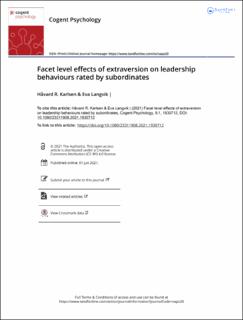| dc.contributor.author | Karlsen, Håvard Rudi | |
| dc.contributor.author | Langvik, Eva | |
| dc.date.accessioned | 2021-06-03T08:08:08Z | |
| dc.date.available | 2021-06-03T08:08:08Z | |
| dc.date.created | 2021-05-16T16:40:13Z | |
| dc.date.issued | 2021 | |
| dc.identifier.citation | Cogent Psychology. 2021, 8 (1), . | en_US |
| dc.identifier.issn | 2331-1908 | |
| dc.identifier.uri | https://hdl.handle.net/11250/2757487 | |
| dc.description.abstract | Several meta-analyses have shown extraversion to be an important predictor of leadership emergence, effectiveness, and behaviour. However, in recent years researchers have shown that in some settings, introverts are equal or even superior leaders. There have also been several calls for researchers to focus on narrower personality traits, as these might be more valid predictors than broader traits. For that reason, the relationship between facets of extraversion and leadership behaviour was investigated. In this study, both leaders and their subordinates (N = 234) participated. Leaders completed the NEO personality inventory and the change, production, employee (CPE) leadership behaviour instrument, while subordinates rated their leader using CPE. Regression analyses showed that the domain extraversion mostly followed the same patterns as in previous studies, being positively related to change and production leadership behaviour. The facets were, however, differently related to leadership behaviours. Assertiveness was positively related to subordinate rated change and production, while excitement seeking was negatively related to self-rated production and subordinate rated employee focused behaviour. The negative relations of excitement seeking illustrates the value of facet-level analysis of personality. | en_US |
| dc.language.iso | eng | en_US |
| dc.publisher | Informa UK Limited | en_US |
| dc.rights | Navngivelse 4.0 Internasjonal | * |
| dc.rights.uri | http://creativecommons.org/licenses/by/4.0/deed.no | * |
| dc.title | Facet level effects of extraversion on leadership behaviours rated by subordinates | en_US |
| dc.type | Peer reviewed | en_US |
| dc.type | Journal article | en_US |
| dc.description.version | publishedVersion | en_US |
| dc.source.volume | 8 | en_US |
| dc.source.journal | Cogent Psychology | en_US |
| dc.source.issue | 1 | en_US |
| dc.identifier.doi | 10.1080/23311908.2021.1930712 | |
| dc.identifier.cristin | 1910285 | |
| dc.description.localcode | © 2021 The Author(s). This open access article is distributed under a Creative Commons Attribution (CC-BY) 4.0 license. | en_US |
| cristin.ispublished | true | |
| cristin.fulltext | original | |
| cristin.qualitycode | 1 | |

